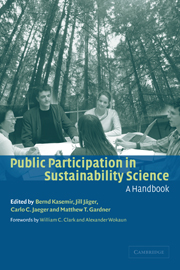Book contents
- Frontmatter
- Contents
- Notes on contributors
- Foreword: science, participation, and sustainability
- Foreword: sustainability, energy use, and public participation
- Preface
- Acknowledgments
- Part I Concepts and insights
- Introduction
- 1 Citizen participation in sustainability assessments
- 2 Contexts of citizen participation
- 3 Models as metaphors
- Part II Experiences with IA Focus Groups
- Part III Further forms of participation
- Part IV Future perspectives
- References
- Index
2 - Contexts of citizen participation
Published online by Cambridge University Press: 22 September 2009
- Frontmatter
- Contents
- Notes on contributors
- Foreword: science, participation, and sustainability
- Foreword: sustainability, energy use, and public participation
- Preface
- Acknowledgments
- Part I Concepts and insights
- Introduction
- 1 Citizen participation in sustainability assessments
- 2 Contexts of citizen participation
- 3 Models as metaphors
- Part II Experiences with IA Focus Groups
- Part III Further forms of participation
- Part IV Future perspectives
- References
- Index
Summary
Climate change: between democracy and expertise?
Climate change represents one of society's most challenging environmental concerns and has been a major factor in changes in the way that environmental policies are debated and informed. Climate change policy faces at least three major challenges: (1) what is known – or not known – about climate change, in particular regarding the relative importance of anthropogenic factors; (2) what can and should be done; and (3) who should do something about it?
Since the 1992 Rio Earth Summit, these challenges have been addressed in several ways: (a) by increasing research and international sharing and integration of expertise on climate change (e.g., the Intergovernmental Panel on Climate Change); (b) by developing international agreements on issues such as the reduction of carbon dioxide emissions; and (c) by promoting national/local strategies to fulfil international agreements (e.g., Local Agenda 21 – community defined strategies for sustainable development arising from the first “Earth Summit” held in Rio in 1992). These challenges all include policy and scientific aspects but also raise questions over the interpretation of Local Agenda 21 (Tuxworth 1996; Selman and Parker 1997; Voisey et al. 1996; Young 1996; Young 1997). How local is “local”? What kind of “agenda” is “Agenda 21”? Whose “agenda” is it? Answers to these questions vary according to the perspectives and purposes of those asking the questions in the first place.
- Type
- Chapter
- Information
- Public Participation in Sustainability ScienceA Handbook, pp. 37 - 61Publisher: Cambridge University PressPrint publication year: 2003
- 9
- Cited by

